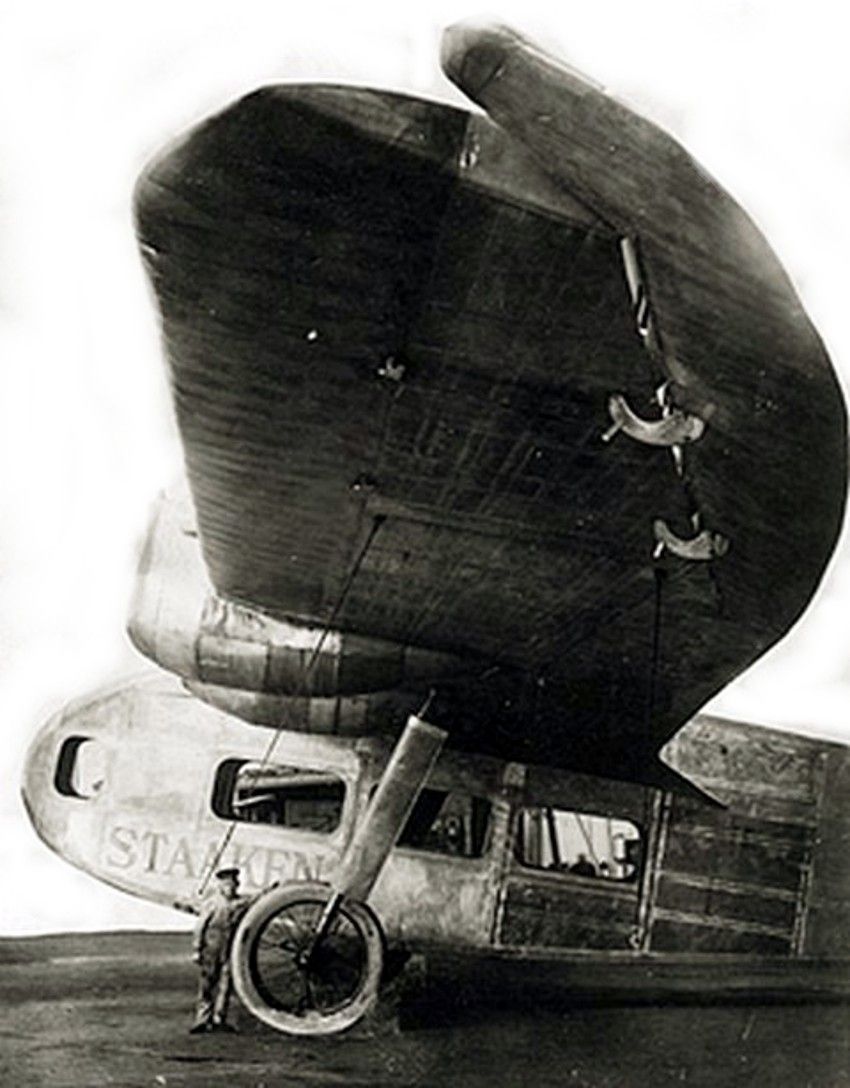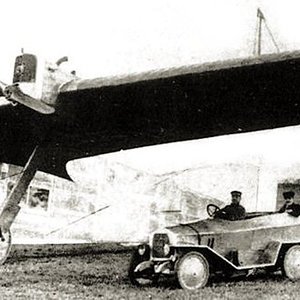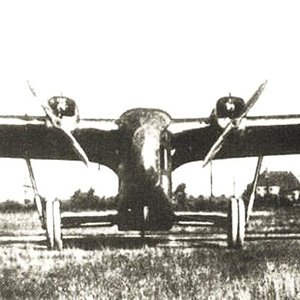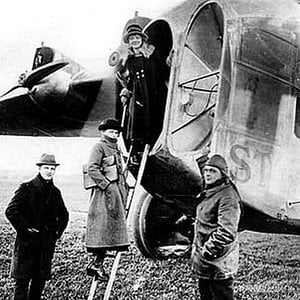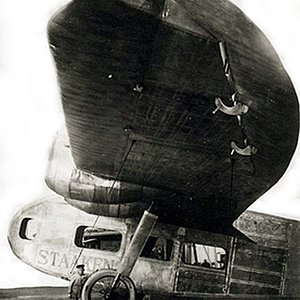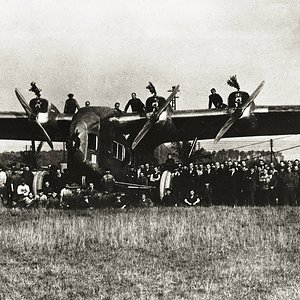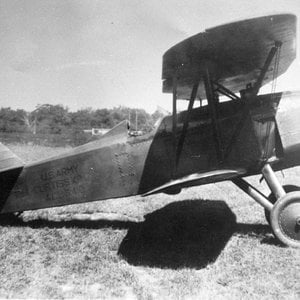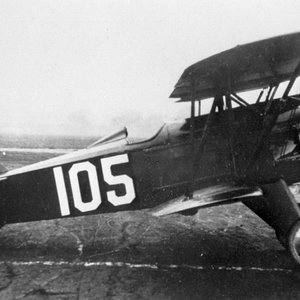Navigation
Install the app
How to install the app on iOS
Follow along with the video below to see how to install our site as a web app on your home screen.
Note: This feature may not be available in some browsers.
More options
You are using an out of date browser. It may not display this or other websites correctly.
You should upgrade or use an alternative browser.
You should upgrade or use an alternative browser.
Design and development
At a time when most aircraft were small single-engined biplanes made of wood and canvas, the E-4was a large—102-foot wingspan all-metal four-engined stress-skinned, semi-monocoque, cantilevered-wing monoplane with enclosed cockpit, accommodation for up to 18 passengers plus crew, including 2 pilots, radio operator, engineer and steward as well as full radio-telegraph communications, toilet, galley and separate baggage and mail storage.
With a maximum speed of 143 mph, cruising speed of 131 mph, a range of about 750 miles (1,210 km), and a fully loaded weight of 18,739 lbs, outperforming most other aircraft of its day.
The E-4 included numerous innovations, including its all-metal monocoque construction, onboard facilities such as lavatory, kitchen and radio communications as well as its notable and sturdy monoplane load-bearing box-girder wing constructed of dural metal which formed both the wing's main girder and the structure of the wing itself. Skinned with thin sheets of dural metal to give the aerofoil shape necessary for a wing, the girder section wing had the leading and trailing edges attached to it. This superb and innovative wing was robust and self-supporting.
The E-4 was completed in 1919 and test flown between 1920 and 1922 when it was broken up on the orders of the Inter-Allied Commission. Some surviving photos in the Smithsonian collection show smiling passengers embarking and disembarking from the aircraft so it is also possible that it saw some limited service as an airliner.[citation needed]
[edit]Background
The Zeppelin-Staaken E-4/20 was a product of the innovative Zeppelin Airship company. Count Ferdinand von Zeppelin, founder of the Luftschiffbau Zeppelin GmbH (Zeppelin Airship Construction Co.) was himself a major aeronautical innovator, creator of the groundbreaking giant aluminium alloy framed Zeppelin lighter than air dirigible airships and later developer of the German R-Planes.
Zeppelin was one of the first aeronautical pioneers to apply stringent scientific principals to the design of aircraft, focusing on issues like power-to-weight ratios of prime movers (engines), using the then new metal aluminium for structural components and so forth. Zeppelin heard of the success in Russia of Igor Sikorsky's pioneering 4-engined Le Grand and Ilya Muromets aircraft. From the outbreak of war in 1914 the 4-engined Ilya Muromets class of aircraft were used as heavy bombers. The German government saw the potential for large strategic bombers and issued a design standard which was used by several manufacturers to produce Riesen-Flugzeuge ("Giant Aircraft") or R-Planes. The most successful design and manufacturing company of R-Planes was Zeppelin which was also the only company to manufacture R-Planes in series production, the R-VI.
[edit]Legacy
Adolf Rohrbach went on to found his own aircraft company, Rohrbach Metall-Flugzeugbau where he designed and built a number of innovative civil all-metal airliners, such as the Ro-VIII trimotor as well as some groundbreaking flying boats.
The Zeppelin-Staaken E-4/20 represents the point at which aircraft transformed from string and canvas to streamlined enclosed metal monoplanes. In the words of the Smithsonian Institution's "Airspace Mag", Rohrbach could have been Germany's Boeing or Douglas but that the ACC deemed the E-4/20 too advanced to be allowed to go into serial production and ordered its destruction, even declining offers to sell it to an allied country.
[edit]Specifications
General characteristics
Crew: 3-5
Capacity: 12 - 18 passengers
Length: 16.6 m (54 ft 6 in)
Wingspan: 31.0 m (101 ft 8 in)
Height: ()
Wing area: 106 m2 (1,140 ft2)
Loaded weight: 8,500 kg (18,740 lb)
Powerplant: 4 × Maybach IVA inline piston engine, 190 kW (250 hp) each
Performance
Maximum speed: 230 km/h (143 mph)
Cruise speed: 211 km/h (131 mph)
Range: 1,200 km (746 miles)
Wing loading: 16.2 lb/sq ft[1] ()
Power/mass: 18 lb/hp ()
At a time when most aircraft were small single-engined biplanes made of wood and canvas, the E-4was a large—102-foot wingspan all-metal four-engined stress-skinned, semi-monocoque, cantilevered-wing monoplane with enclosed cockpit, accommodation for up to 18 passengers plus crew, including 2 pilots, radio operator, engineer and steward as well as full radio-telegraph communications, toilet, galley and separate baggage and mail storage.
With a maximum speed of 143 mph, cruising speed of 131 mph, a range of about 750 miles (1,210 km), and a fully loaded weight of 18,739 lbs, outperforming most other aircraft of its day.
The E-4 included numerous innovations, including its all-metal monocoque construction, onboard facilities such as lavatory, kitchen and radio communications as well as its notable and sturdy monoplane load-bearing box-girder wing constructed of dural metal which formed both the wing's main girder and the structure of the wing itself. Skinned with thin sheets of dural metal to give the aerofoil shape necessary for a wing, the girder section wing had the leading and trailing edges attached to it. This superb and innovative wing was robust and self-supporting.
The E-4 was completed in 1919 and test flown between 1920 and 1922 when it was broken up on the orders of the Inter-Allied Commission. Some surviving photos in the Smithsonian collection show smiling passengers embarking and disembarking from the aircraft so it is also possible that it saw some limited service as an airliner.[citation needed]
[edit]Background
The Zeppelin-Staaken E-4/20 was a product of the innovative Zeppelin Airship company. Count Ferdinand von Zeppelin, founder of the Luftschiffbau Zeppelin GmbH (Zeppelin Airship Construction Co.) was himself a major aeronautical innovator, creator of the groundbreaking giant aluminium alloy framed Zeppelin lighter than air dirigible airships and later developer of the German R-Planes.
Zeppelin was one of the first aeronautical pioneers to apply stringent scientific principals to the design of aircraft, focusing on issues like power-to-weight ratios of prime movers (engines), using the then new metal aluminium for structural components and so forth. Zeppelin heard of the success in Russia of Igor Sikorsky's pioneering 4-engined Le Grand and Ilya Muromets aircraft. From the outbreak of war in 1914 the 4-engined Ilya Muromets class of aircraft were used as heavy bombers. The German government saw the potential for large strategic bombers and issued a design standard which was used by several manufacturers to produce Riesen-Flugzeuge ("Giant Aircraft") or R-Planes. The most successful design and manufacturing company of R-Planes was Zeppelin which was also the only company to manufacture R-Planes in series production, the R-VI.
[edit]Legacy
Adolf Rohrbach went on to found his own aircraft company, Rohrbach Metall-Flugzeugbau where he designed and built a number of innovative civil all-metal airliners, such as the Ro-VIII trimotor as well as some groundbreaking flying boats.
The Zeppelin-Staaken E-4/20 represents the point at which aircraft transformed from string and canvas to streamlined enclosed metal monoplanes. In the words of the Smithsonian Institution's "Airspace Mag", Rohrbach could have been Germany's Boeing or Douglas but that the ACC deemed the E-4/20 too advanced to be allowed to go into serial production and ordered its destruction, even declining offers to sell it to an allied country.
[edit]Specifications
General characteristics
Crew: 3-5
Capacity: 12 - 18 passengers
Length: 16.6 m (54 ft 6 in)
Wingspan: 31.0 m (101 ft 8 in)
Height: ()
Wing area: 106 m2 (1,140 ft2)
Loaded weight: 8,500 kg (18,740 lb)
Powerplant: 4 × Maybach IVA inline piston engine, 190 kW (250 hp) each
Performance
Maximum speed: 230 km/h (143 mph)
Cruise speed: 211 km/h (131 mph)
Range: 1,200 km (746 miles)
Wing loading: 16.2 lb/sq ft[1] ()
Power/mass: 18 lb/hp ()

